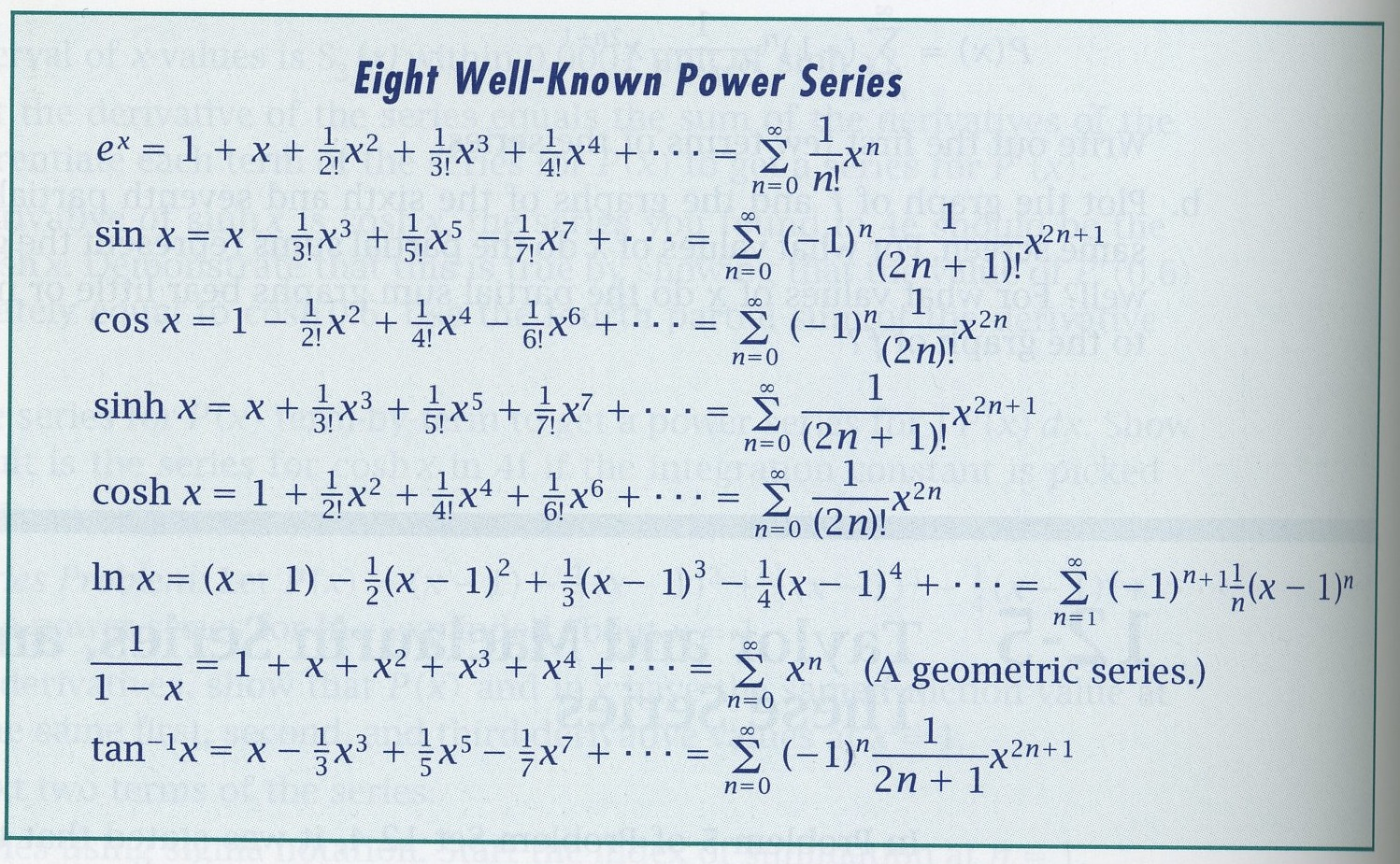ch 12 test WOOOOOOOOOOOOOOOOOOOOOOOOOOOOOO
1/22
There's no tags or description
Looks like no tags are added yet.
Name | Mastery | Learn | Test | Matching | Spaced |
|---|
No study sessions yet.
23 Terms
explicit and recursive equations for arithmetic and geometric sequences and series
arithmetic
sequence
explicit: tn = t1 + (n-1) d
recursive: tn = tn-1 + d
series
explicit: n(t1 +t2)/2
recursive: u(n) = u(n-1)+(u(nMin-1) + dn)
geometric
sequence
explicit: tn = t1 * r ^ n-1
recursive: tn = (tn-1)r
series
explicit: t1(1-r^n)/1-r
recursive: u(n) = u(n) = u(n-1) + u(nMin)(r ) ^n
when does a geometric infinite series converge
when the abs of r is less than 1
what value does it converge to
t1 over 1-r
partial sum of geometric series
t1 times 1-r^n over 1-r
power series formula
f^n(a)
sigma —--—- (x-a)^n
n!
eight basic power series

what does root technique prove
absolute convergence and therefore regular convergence
list of tests
nth term test
harmonic series
p series test
geometric series test
alternating series test
integral test
ratio test
direct comparison test
limit comparison test
conditions of nth term test and what does it prove
conditions: none
proves: divergence
if the limit does not equal 0, it diverges
conditions of harmonic test and what does it prove
conditions: terms pos
proves: divergence
pos reciprocal of arithmetic series means it diverges
conditions of p series test and what does it prove
conditions: terms are pos
proves: convergence and divergence
if p > 1, converges, if p is <= 1, diverges
conditions of geometric test and what does it prove
conditions: summand is geometric
proves: convergence and divergence and convergence value
if |r| < 1, converges to t1 / 1-r
else, diverges
conditions of alternating test and what does it prove
conditions: terms alternate in sign, |tn| decreases, lim as n goes to infinity is 0
proves: convergence
if conditions are met, it converges. else, indeterminate
conditions of integral test and what does it prove
conditions: pos, terms decrease, and continuous
proves: convergence and divergence
whichever the integral converges/diverges, same happens to og function
conditions of ratio test and what does it prove
conditions: none
proves: convergence and divergence
if L is the limit as n approaches infinity of |tn+1 / tn| and L < 1 converges absolutely, if L > 1 diverges, else indeterminate
conditions of direct comparison test and what does it prove
conditions: an + bn > 0
proves: convergence and divergence
if bound above by convergence then converges, if bound below by divergence then diverges
else indeterminate
conditions of limit comparison test and what does it prove
conditions: f(n) > 0 and g(n) > 0
proves: convergence and divergence
if L > 0 then f(n) converges however g(n) does
if L = 0 and g(n) converges, then f(n) converges
if L = infinity and g(n) diverges, then f(n) diverges
convergence with combined series
if two combined series separately converge, then sum converges
if one series converges but the other diverges, then sum diverges
if both diverge, then indeterminate
estimating |Rn| with alternating series
if an infinite series converges by alternating series test, then |Rn| <= |tn+1| (the next term in the series)
estimating with integral test
|Rn| will be <= the | integral from the index of the partial sum (same index) to infinity |
first have to show series passes conditions of integral test
error equations
|Rn| = |f(b) - Pn(b)|
|Rn| <= |f^n+1(c ) |
| ——— (b-a) ^ n+1 |
| (n+1)! |
how to find series of PS from seq of PS
the difference between succeeding terms in a seq of PS is the values of the par series
so just take the differences between the sequence terms and those are the terms of your partial series
don’t forget
PLUS C
show partial sum for telescoping series